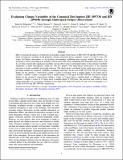Evaluating Climate Variability of the Canonical Hot-Jupiters HD 189733b and HD 209458b through Multi-epoch Eclipse Observations
Author(s)
Kilpatrick, Brian M.; Kataria, Tiffany; Lewis, Nikole K.; Zellem, Robert T.; Henry, Gregory W.; Cowan, Nicolas B.; de Wit, Julien; Fortney, Jonathan J.; Knutson, Heather; Seager, Sara; Showman, Adam P.; Tucker, Gregory S.; ... Show more Show less
DownloadPublished version (1.157Mb)
Publisher Policy
Publisher Policy
Article is made available in accordance with the publisher's policy and may be subject to US copyright law. Please refer to the publisher's site for terms of use.
Terms of use
Metadata
Show full item recordAbstract
Here we present the analysis of multi-epoch secondary eclipse observations of HD 189733b and HD 209458b as a probe of temporal variability in the planetary climate using both Spitzer channels 1 and 2 (3.6 and 4.5 μm). We expect hot-Jupiter atmospheres to be dynamic environments exhibiting time varying weather. However, it is uncertain to what extent temporal variability will be observable when considering disk integrated observations. We do not detect statistically significant variability and are able to place useful upper limits on the infrared variability amplitudes in these atmospheres. There are very few planets with multi-epoch observations at the required precision to probe variability in dayside emission. The observations considered in this study span several years, providing insight into temporal variability at multiple timescales. In the case of HD 189733b, the best-fit eclipse depths for the channel 2 observations exhibit a scatter of 102 ppm about a median depth of 1827 ppm and in channel 1 exhibit a scatter of 88 ppm about a median depth of 1481 ppm. For HD 209458b, the best-fit eclipse depths for the channel 2 observations exhibit a scatter of 22 ppm about a median depth of 1406 ppm, and in channel 1 exhibit a scatter of 131 ppm about a median depth of 1092 ppm. The precision and scatter in these observations allow us to constrain variability to less than (5.6% and 6.0%) and (12% and 1.6%) for channels (1, 2) of HD 189733b and HD 209458b, respectively.
Date issued
2020-01Department
Massachusetts Institute of Technology. Department of Earth, Atmospheric, and Planetary SciencesJournal
Astronomical Journal
Publisher
American Astronomical Society
Citation
Kilpatrick, Brian M. et al. "Evaluating Climate Variability of the Canonical Hot-Jupiters HD 189733b and HD 209458b through Multi-epoch Eclipse Observations." Astronomical Journal 159, 2 (January 2020): 51 © 2020 American Astronomical Society
Version: Final published version
ISSN
1538-3881